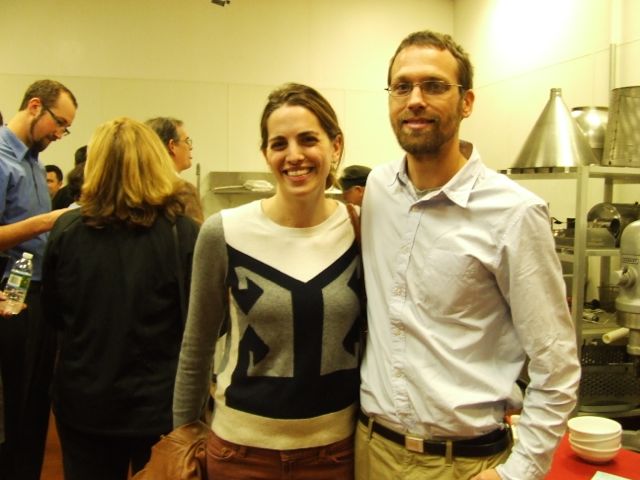SUSTAINABLE PARTNERSHIP:Woody Eaton of Blue Ridge Biofuels and Katie Button of Cúrate are working together through the Fields to Fryer to Fuel program to provide a locally produced food-grade canola oil for area restaurants that can be processed into fuel right here in WNC.
Although the four bowls of canola oil were identified only by numbers, it was easy to see by appearance alone that one of them had something distinctively different going on. Guests at Advantage West Economic Development Group’s “Fry Party” taste-tested the oils with locally grown greens and chunks of artisan bread, and it was no surprise when the votes were tallied and the deeply tinted, golden No. 3 beat its clear, pale rivals hands down.
No. 3 was revealed to be (drum roll, please) a raw canola oil produced by the Field to Fryer to Fuel (F3) project, a far-reaching new biofuel sustainability initiative dreamed up by the folks at Blue Ridge Biofuels. Advantage West held the “Fry Party” last week at a kitchen at Blue Ridge Food Ventures, located on AB-Tech’s Enka campus, to bring local attention to F3, an effort that pilots a new business model for the production of biodiesel from locally grown canola.
The program, according to project director Ron Townley, is aimed at ultimately reducing Western North Carolina’s dependence on imported fuels by creating a partnership among area farmers, restaurants and biofuel producers. Through F3, project partners plant canola seed that is expeller pressed into food-grade fryer and raw, room-temperature oil for area restaurants. The used fryer oil is then converted into biofuel. The whole process, from sowing seed to producing fuel, takes less than one year.
Right now, all the oil being used in Asheville partner restaurants is grown by partner farmers in Tenn., Ala., Ky., S.C., Ga. and eastern N.C., and processed at AgStrong, a facility in Bowersville, Ga. Townley says this arrangement was recently put in place to build new market demand for canola oil that will soon be grown and processed in Western North Carolina.
Last year, F3 planted and harvested 51 acres of non-GMO canola, a winter and early-spring crop, at the Biltmore Estate, with another 50 acres planned for this year. In addition, three WNC farmers are partnering with F3 this winter to grow their first crops.
Mountain Food Products distributes the oil to the six Asheville restaurants, including Curate and Rosetta’s Kitchen, that have already jumped onboard with F3. Blue Ridge Biofuels then picks up the used oil and processes it into fuel.
This farm-to-restaurant-to-fuel cycle creates what Melita Kyriakou of Blue Ridge Biofuels describes as a “closed loop of sustainability.” “This,” says Kyriakou, gesturing to the greens and potatoes from Leicester’s Full Sun Farm and the kitchen’s fryer vats, “is what true sustainability looks like.” She notes that the machinery at Full Sun Farm is powered by biodiesel made from used fryer oil.
Katie Button, chef at Cúrate, was among the group of Asheville culinary heavyweights who gathered at the event. Button recently received the Rising Stars Sustainability Award from Star Chefs magazine, partly due to her participation in the F3 program. Button says she is thrilled to be a part of the project because of its contribution to local sustainability, but she says she also prefers the flavor of F3 canola oil over other fryer oils.
“We did a taste test with the oil we were using before and the oil from Georgia [the F3 oil],” she explains. “We fried things side by side, and you could really tell a difference in the taste. The other product leaves an after-taste.”
Ron and Valerie Patton, owners of Vortex Doughnuts, were also present at the event and said they were impressed with the F3 oil. They are considering partnering with F3 as they work toward the opening of their new South Slope storefront this coming spring. “We currently use palm oil,” says Ron, “But we’re going to try it [the F3 oil], maybe in a blend.”




Why not make it available in local grocery stores? I’d buy it since non-GMO canola oil is stupid expensive.